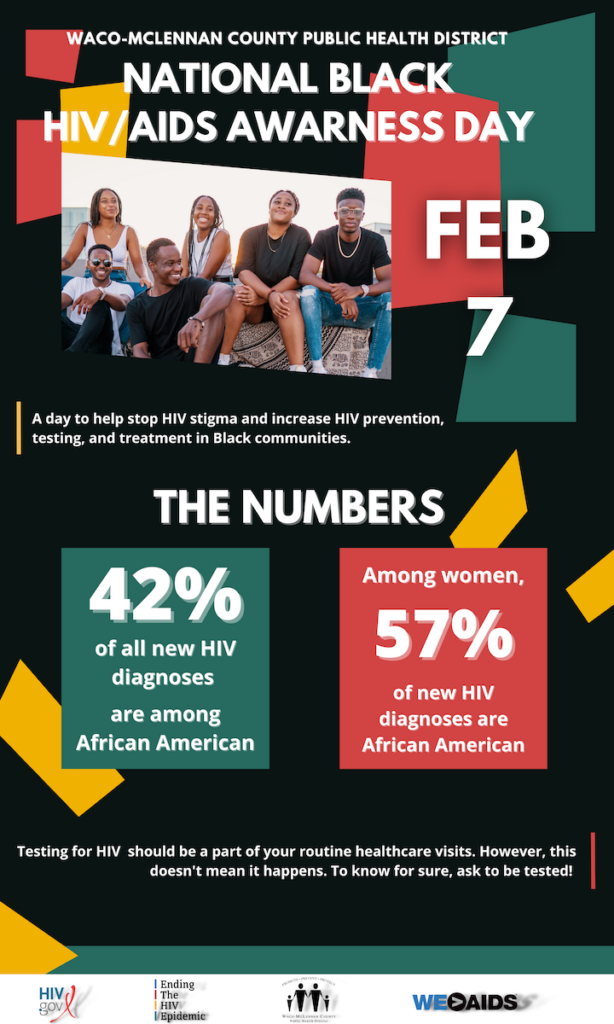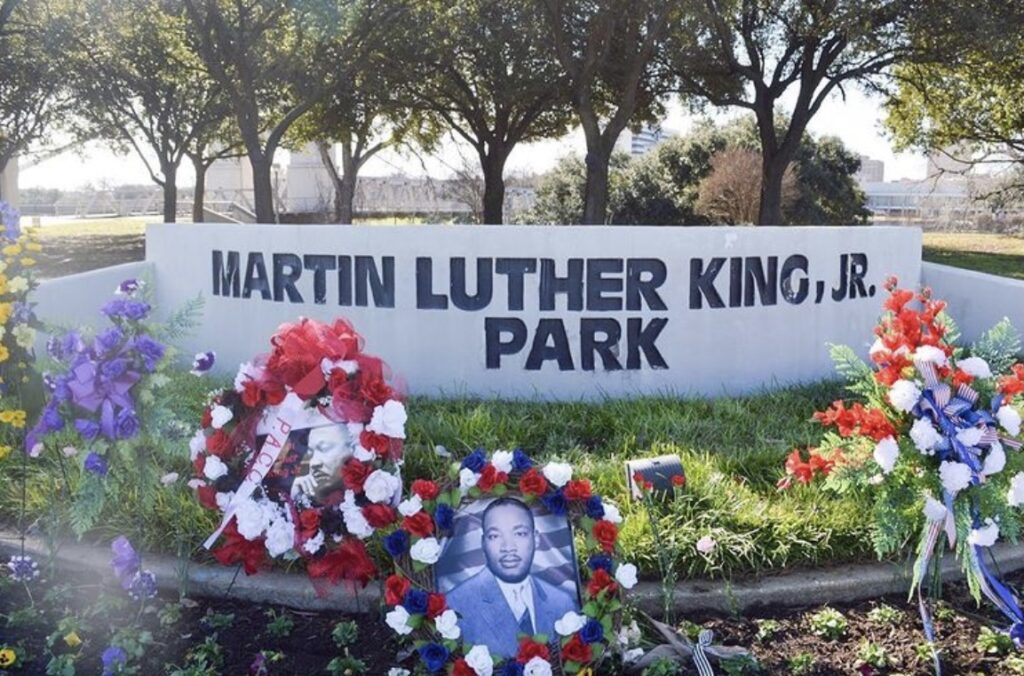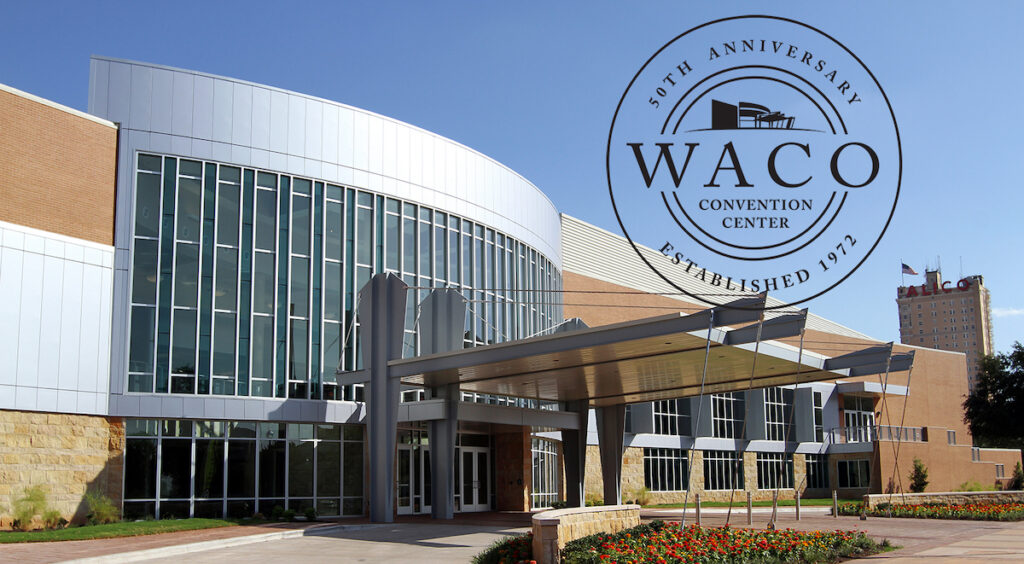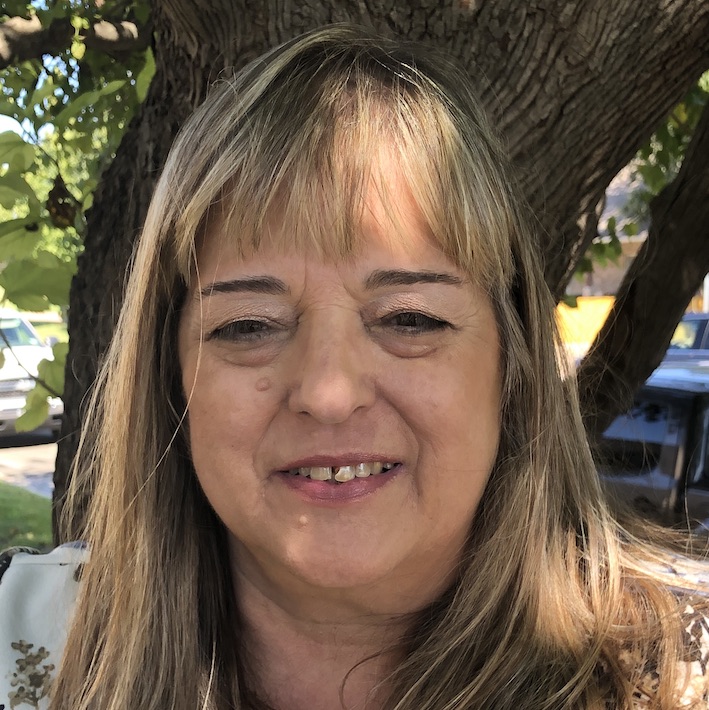By Deneece Ferrales
Feb. 7 is National Black HIV/AIDS Awareness Day. Uriah Robertson and the team at Waco-McLennan Public Health District who work in the clinic for HIV/AIDS services are preparing to use the occasion to raise HIV/AIDS awareness and encourage testing.“

Studies show that African Americans make up about 45 or 47 percent of new HIV diagnoses,” Robertson said. “Amongst women, we are seeing that African American women are 57 percent of new diagnoses. So, how do we decrease the numbers? We have to educate, advocate, encourage routine testing and so much more.”
As a risk reduction specialist, Robertson said his job is to “work with the community to provide intervention and prevention tools. We even perform HIV testing and encourage the importance of knowing your status.” Risk reduction specialists “have those conversations that others are afraid to have. We work to build rapport with our clients so we can get out into the clinic so that we can get the word out about our services while also working to break down the walls of stigma about HIV/AIDS.”
According to HIV.gov, a website managed by the U.S. Department of Health and Human Services, he first Black HIV/AIDS Awareness Day was held in 1999 as a grassroots opportunity to raise awareness in minority communities. In 2001, the day was given national status. This became needed as the number of new infections were disproportionately affecting people of color, particularly Black communities. At that point, new cases of HIV were escalating so quickly in the Black community that national leaders and the Centers for Disease Control began concerted efforts to combat the spread of HIV/AIDS in communities of color. According to the CDC, the history of these efforts includes:
- In 1998, the Congressional Black Caucus joined African American leaders from all over the U.S. to declare a “state of emergency” and created the Minority AIDS Initiative to offer funding for prevention efforts in Black communities. The CDC launched an array of prevention efforts aimed at preventing the spread of HIV among African Americans as a result of this funding.
- In 2000, HIV cases among Black and Latino men exceeded cases among White men, which was disproportionate to the general population, thus calling attention to health inequities surrounding the spread of HIV/AIDS.
- In 2007, the CDC launched its expanded HIV testing initiative to increase testing opportunities, primarily among African Americans.
- In 2008, the Black AIDS Institute reported that if Black America were its own country, it would rank 16th in the world in terms of number of people with HIV. It was estimated that 1 in 16 Black men would contract HIV/AIDS in their lifetime (approximately 6% of the population) and 1 in 32 Black women would contract HIV/AIDS in their lifetime.
- In 2010, the Obama Administration released first National HIV/AIDS strategy for the United States, which called on the nation to focus HIV prevention efforts on those at greatest risk, including African Americans.
Despite these efforts, sadly, this has not changed in the past 23 years. African Americans, more than any other race, have the highest rates of HIV infection in the nation. Black Americans account for approximately 14% of the U.S. population, but nearly half of those living and dying with HIV and AIDS are Black. Within this population, gay and bisexual men are the most affected, followed by heterosexual women. AIDS is the third leading cause of death among Black women aged 25–34 and 35– 44 and among Black men aged 35–44 (CDC).
Not only does this health inequity appear in the number of African Americans contracting HIV/AIDS, it also appears in the treatment of HIV/AIDS. Compared to all other persons with HIV, African Americans had the lowest rates of viral suppression. According to the CDC, out of every 100 Black persons living with HIV, only 63 are receiving some type of HIV care, 48 of 100 were retained in HIV care, and 51 of 100 were virally suppressed. This means that little more than half of all African Americans living with HIV received any type of treatment.

Though HIV is preventable, prevention remains the biggest challenge and further calls attention to the health inequities around this disease in Black communities. The challenges to prevention efforts include the stigma of a positive HIV status, people not having awareness of their HIV status, homophobia, racism, and mistrust of the healthcare system.
Lack of awareness of one’s HIV status can also lead to poor HIV treatment outcomes. Further, STI rates among African Americans are higher than among any other minority group, and there is a link between being diagnosed with other Sexually Transmitted Infections (STIs) and contracting HIV.
Lastly, persons experiencing poverty, which is higher in Black communities, are less likely to have access to quality healthcare for HIV, stable housing, and HIV prevention services.
So where do we start in addressing this health inequity? The most important place to begin is to encourage testing. If HIV is left untreated, chronic illness and death are the likely outcomes.
The first step to preventing this is for a person to know his or her status. Knowing one’s status can also prevent the further spread of HIV. Health professionals must continue to partner with Black community leaders to make outreach efforts aimed at more testing and increased awareness of prevention.
HIV treatment and prevention has come a long way in the past three decades. On Feb. 7, it is important to increase awareness of the continued need to address HIV prevention and treatment, particularly in Black communities. This is also a great day to encourage testing and the importance of knowing your status. Together, we can continue that fight to eradicate HIV/AIDS.

Deneece Ferrales, Ph.D., is director of health initiatives for Prosper Waco.
The Act Locally Waco blog publishes posts with a connection to these aspirations for Waco. If you are interested in writing for the Act Locally Waco Blog, please email the ALW team — [email protected].
The Bridge2Health Program is aimed at reducing the burden of obesity and chronic diseases in Waco-McLennan County to improve population health and quality of life. The Waco-McLennan County Public Health District will be offering two free classes starting in February to promote healthy living and prevent chronic disease among community members, Health 360 and Create Better Health.
Starting February 10th, classes are every Thursday from 6-7 pm via zoom.
Sign Up Now
Health 360 is a 1-year class for people that are at risk of developing Type 2 Diabetes to help them prevent or delay Type 2 Diabetes through nutrition and physical activity. Health 360 starts on February 8th and will meet every Tuesday with two session options, 1-2PM and 6-7PM.
Create Better Health is a 16-week class that helps people gain the skills to be active and eat healthy on a budget.
Sign Up Now
If you have any questions call: 254-750-5435



Four Waco residents filed for places on the City of Waco ballot in the May 7 general election. Positions on the ballot include mayor and council member for Districts I and III. Also, a special election will be included to select someone to fill an unexpired term for District II.
The following candidates filed by 5 p.m. Wednesday, Jan. 19:
Mayor — Dillon Meek, attorney
District II — Armando Arvizu, caregiver, and Tiffany Vidaña, substitute teacher
District III — Josh Borderud, attorney
The last day to file is Friday, Feb. 18, at 5 p.m. to have the name of the candidate placed on the ballot, should be filed with the City Secretary in the City of Waco City Secretary’s Office, 300 Austin Ave., 1st Floor of City Hall. Because City Hall is closed due to COVID-19 restrictions, call the City Secretary’s Office during normal business hours of Monday through Friday from 8 a.m. to 5 p.m. at 254-750-5750.
By Alice Jauregui
Candiates for the Waco ISD School Board election began filing Wednesday, Jan. 19., the first day of the filing period for two district trustee positions. Filing will open Jan. 28 for an at-large WISD Board position.
Three candidates filed on the first day. Jonathan Grant and Hope Balfa Mustakim filed to represent Trustee District 4, and Emily Iazzetti filed in Trustee District 5.
On May 7, voters will elect one person in each of those districts to serve a three-year term on the Waco ISD Board of Trustees. The deadline for candidates to file for a place on the ballot is 5 p.m. Feb. 18.
District 4 is currently represented by Angela Tekell, who announced last month that she did not plan to seek re-election. Tekell was first elected to the board in 2010.
Iazzetti was appointed to represent District 5 in August following the resignation of Allen Sykes.
In May, voters will also elect someone to serve the final year of the current term for the vacant at-large seat on the Waco ISD school board. The vacancy was created when Cary DuPuy resigned in November. The following month, the school board announced they would leave the position vacant until the May election. The filing period for the at-large position will open Jan. 28 and end at 5 p.m. March 7.
More information about becoming a candidate is available at wacoisd.org/elections. Applications for a place on the ballot can be filed with the superintendent’s office at the Waco ISD Administration Building (501 Franklin Ave., Waco).
The Waco ISD Board of Trustees recently adjusted boundaries of the single-member trustee districts to equalize the number of people in each district following the 2020 Census. A map of the single-member trustee districts along with a description of those changes can be found at wacoisd.org/redistricting.
Alice Jauregui is executive director of communication with Waco ISD.
The Act Locally Waco blog publishes posts with a connection to these aspirations for Waco. If you are interested in writing for the Act Locally Waco Blog, please email the ALW team — [email protected].
Monday, January 17th, is Martin Luther King Jr. Day. This marks the anniversary of the federal day of service and celebrates the legacy of the great civil rights leader. Each year, on the third Monday in January, the MLK Day of Service is observed as a “day on, not a day off.” MLK Day of Service is intended to empower individuals, strengthen communities, bridge barriers, create solutions to social problems, and move us closer to Dr. King’s vision of a “Beloved Community.” Our community can take this unique opportunity to bring people from all walks of life together to listen, learn, serve, and act locally.

Friday, January 14
35th Annual Wreath Laying Ceremony
Dr. Martin Luther King, Jr. Memorial Park- 300 MLK Blvd.
The 35th annual wreath laying ceremony will be a virtual event this year because of the recent COVID-19 surge. Individuals may place a wreath at the monument anytime from January 14 through January 17. Please adhere to City of Waco social distancing guidelines and health protocols.
Monday, January 17
MLK Day of Service – Baylor Campus
Sponsored by Missions and Public Life
Bobo Spiritual Life Center (Parking lot at the corner of S. 5th Street and James Ave., Waco, Texas) 9:00 a.m. to 1:00 p.m.
Virtual service projects and a drive-thru collection site. Visit website for donation list.
Contact [email protected] for more information.
Day of Service to help out the Good Neighbor House
Hosted by Sanger Heights at 23rd & Colcord
Help them complete various projects including light painting, light constructions tasks, some deep cleaning around the house, yardwork, and various other projects. Please review the available slots and sign up.
25th Annual Martin Luther King, Jr. March & Observance
Hosted by Zeta Phi Beta Sorority, Inc. Delta Upsilon Zeta and Phi Beta Sigma Fraternity, Inc. Gamma Omicron Sigma.
Dr. Martin Luther King Blvd. & Elm Ave at 9:00 a.m.
Guest Speaker Chief of Police, Sheryl Victorian. For more information and to RSVP, please visit bit.ly/wacomlkmarch.
Spend MLK day at the Mayborn Museum, 1300 S University Parks Dr
Open Monday at 10 a.m. for free!
Community Day is a perfect opportunity to explore the Discovery Center, Natural History Hall, and Historic Village.
Hosted by Mission Waco / Jubilee Theatre 1319 N. 15th Street, Waco, Texas
10:30-11:45 am: Performances and speakers.
12-1 pm: Pastor Panel Discussion – Lunch is FREE and provided by World Cup Cafe. No need to register for the morning OR the lunch programming.
Youth meet separately. Email [email protected] if you have teenagers interested in joining. Lunch is also FREE!
1:15-3:30 pm: Community Serving Projects: If you’re interested in signing up a group to serve in the afternoon please fill out the google form
6:00 PM
A candlelight vigil will also be held virtually. To obtain a link for the event, email [email protected].

By Natalie Galindo
The Waco Convention Center is turning 50 years old in 2022. A come-and-go reception will be held 3-6 p.m. Jan. 26, in the center’s Brazos Ballroom. Remarks and a retrospective of the center’s history will take place at 4 p.m. The public is invited. Light refreshments will be served.

The convention center’s original grand opening celebration took place in January 1972 and featured a week’s worth of entertainment, with top headliner Peter Nero. The original building, consisting of a much smaller footprint and cost almost $2.6 million to build.
In 1988, McLennan Hall, Bosque Theater, and DeCordova Rooms were added to accommodate larger events, at a cost of $1.2 million.
The building enjoyed a $17-million top to bottom renovation in 2012, which added a new wraparound foyer for McLennan Hall, more lobby space, escalators, and more.
“The Waco Convention Center has been the place for so many Wacoans to make memories over the years,” said Dan Quandt, Waco’s interim conventions and tourism director. “Weddings, graduation ceremonies, quinceañeras, dances, and of course conventions have all been held here. These events become part of our lifelong memories. We look forward to serving Waco for the next fifty years and beyond.”
The public is invited to share their memories through photos of events held at the Waco Convention Center over the years, for possible inclusion in the slide show. Please visit wacocc.com/share-your-memories or drop them by in person at the Waco Convention Center, 100 Washington Avenue. Offices are on the right inside the main doors. For more information, contact Carla Pendergraft, (254) 750-5806.
The Waco Convention Center is a department of the City of Waco.
The Act Locally Waco blog publishes posts with a connection to these aspirations for Waco. If you are interested in writing for the Act Locally Waco Blog, please email the ALW team — [email protected].
By Lisa Elliott
The McLennan Community College Foundation will be joined Tuesday, Jan. 11, by MCC and community leaders to mark the opening of a new outdoor gathering space on the MCC campus. The Greta and Murray Watson, Jr., Arbor will open with a ribbon cutting ceremony at 1:30 p.m. beside the Enrollment Services Center. The ceremony will conclude with hot chocolate and cookies, and the public is invited.

The Watson Arbor project was conceived and funded through the generosity of Brazos Higher Education Service Corp., the student loan financing company founded by Murray Watson, Jr., in 1975. Among other gifts, the company and the Watson family have funded more than $579,000 in endowed scholarships through the MCC Foundation to support the McLennan Presidential Scholars program.
To honor its founder’s lifelong support of higher education, Brazos and the Watson family wished to create an outdoor space where students, faculty and staff at the college could gather. The company’s generosity means no college funds were expended for this beautiful campus enhancement.
Watson was a lawyer, rancher, politician, and philanthropist who had a passion for serving others. He was elected to the Texas State House of Representatives at age 24, shortly after graduating from Baylor Law School. He represented Central Texas in the Texas House until 1963, when he was elected to the Texas Senate, where he served until 1973.
As senator, Watson carried many important pieces of legislation, but he was especially proud of helping create what is now Texas State Technical College (TSTC), and he was a strong advocate for establishing MCC in 1965. Watson passed away in 2018, and his wife, Greta, continues to lead the family’s Mart-based operations, including a cattle company and Watson Feed Store. Their daughter, Missy Larson, also serves on the MCC Foundation Board of Directors.
“We are so grateful to our friends at Brazos Higher Education Service Corporation and the Watson family for their generous donations to our campus and student scholarships. This space will provide an area where our students are able to relax, study and find tranquility in their busy schedules,” said MCC President Johnette McKown. “This is the perfect tribute to the Watson family that cares so deeply about students and their success.”
The MCC Foundation raises public and private support to fund scholarships, faculty and staff professional development and capital projects at the college. To learn more, visit www.mclennan.edu/foundation or contact Executive Director Kim Patterson at 254-299-8606 or [email protected].
The Act Locally Waco blog publishes posts with a connection to these aspirations for Waco. If you are interested in writing for the Act Locally Waco Blog, please email the ALW team — [email protected].

Waco is proud to welcome Olive Door Imports to the Downtown scene. Located at 924 Austin Ave, Olive Door Imports store sells 17th-18th century furniture with a story. Each piece is hand-selected from Europe – places like Denmark, Brussels, Hungary, and other eastern European locations. Owner Shelley Gay says opening the store was a dream 20 years in the making. She chose Waco as the ideal location after a falling in love with the community on a weekend visit. Shelley’s goal is to offer affordable, artistic furniture for the creative who wants to make their space truly their own. According to Shelley, these are “pieces you may not have seen before and may never see again”.
We’d love to see you at the Grand Opening happening January 15th from 6-9 pm! This isn’t your ordinary grand opening: January 15th will also feature stunning artwork by DVLVD LLC. If this name sounds familiar, you may remember an art expo hosted at Cultivate 712 in 2020 or seen any of the DVLVD mural paintings throughout town (the most recent work being the Cactus Rose face, the interior of Milo All day, and the mural on the Dr. Pepper Museum). DVLVD (pronounced Devolved) is a mural and design group based in Waco, TX. The team includes Cade Kegerreis, Cole Henry, Kyle Antis & Kaleb Antis. They specialize in hand-painted works that range from large-scale public art projects to small business storefronts. Founded in 2020, their mission is to bring forward the art of empowered artists to the public. Waco is so pleased to have this team of artists dedicated to unity, diversity and connection. For more information, you can visit their Instagram page @dvlvdmurals or visit the website www.dvlvd.com.
Mark your calendars for this awesome grand opening on Saurday, January 15th – you won’t want to miss it! Art from DVLVD will continue to show through the end of February. Olive Door Imports hopes to feature the work of artists at shows every 6 weeks. Shelley, Brooks, and the team look forward to meeting you and the rest of the Waco community.
By Deneece Ferrales
For many of us, the new year means time to set our new year’s resolution(s) — a goal or set of goals that are generally designed to help one become happier, healthier, more successful, and/or have increased life enjoyment. According to several studies, health goals are the most common resolutions.

In the United States, exercising more, losing weight, and better mental health are among the top five resolutions every year. These are important, especially in light of the COVID pandemic continuing to limit our contact with others and limiting how and when we can participate in healthy activities such as exercise or even the ability to access healthy foods.
Keeping up a healthy exercise routine and healthy eating are imperative both to our physical and our mental health. Unfortunately, despite our best intentions, many of our resolutions will be abandoned before January ends.
The collective wisdom regarding resolutions has always been that discipline is key and that if we fail at keeping a resolution, it is because of poor self-discipline. However, simply telling ourselves to do it does not lead to success. According to US News & World Reports, we normally set resolutions based on our Christmas excesses (eating, failing to get exercise during the holidays, etc.) without preparing ourselves for the changes we plan to make in our lives.
There is a discomfort that comes with change, even when that change leads to feeling better. We have to readjust our schedules for exercise, amend our shopping habits to seek out healthier foods, or make other intentional changes to our daily routines and habits. This is stressful because the act of change, any change, produces emotional friction.
If we have not determined when and how we plan to exercise or made a plan for any grocery shopping changes needed to be able to purchase healthier foods, then we are doomed to fail when we experience that transient discomfort. It is important to plan for the change and give yourself a step-by-step guide to when and how each change will occur. Even with the best plans, transient discomfort will occur, but it is much easier to follow a well-thought-out plan through the change than to add further stress from indecision.
Here are some tips for keeping those healthy new year’s resolutions:
- Turn your broad health resolutions into specific goals with steps for accomplishing those goals. I like using SMART goals (specific, measurable, attainable, realistic, and timed). SMART helps us think out exactly how and when we plan to make our changes and then gives us time limits for accomplishing our goals. So instead of having a resolution that says, “Get more exercise,” your resolution reads, “Take a mile-long walk 4 times a week for the next three months.”
- Think small. Set your goals for something accomplishable. You may want to run in next year’s marathon, but you have not begun to train yet. Setting a goal that is not reachable or that will require work over a long period of time is likely to lead to disappointing results and goal abandonment. It might be better to start with a smaller goal, like running a mile or running 3 times a week, and as you reach each goal, set another until you are ready to run that marathon.
- Consider your why. Setting goals that lead to better health is always a good idea. The meaning of those goals is different for each person. One person may be diabetic and interested in lowering their A1C, while another person may want to increase stamina to be able to participate in more activities. Whatever your reason, this can be what keeps you motivated on those days when you are not feeling it. If your goals revolve around exercise and/or healthier eating, try to stay away from an appearance-focused why.
- Keep it all in the family! Parents have to consider their children’s needs, which are sometimes unpredictable. Setting a health resolution for the whole family makes reaching your goals a “family affair” and prevents you from having to choose between your family and your own personal growth.
The Robert Wood Johnson Foundation published a report titled, “State of Childhood Obesity: Prioritizing Children’s Health During the Pandemic.” The report states that more than 15% of children (1 in 7) between the ages of 10 and 17 are obese. Childhood obesity leads to a host of health problems in adulthood. For this reason, including the children in developing healthy goals now will give them a foundation for continuing healthy practices.
If setting a family health resolution, call a family meeting so everyone has input. Define what a resolution is so that the entire family understands the importance of setting the goal. Talk about your family’s good health habits and bad ones to determine the best family resolution.
- Write down your goals/resolutions. Writing down your resolutions helps make your goals more intentional. Looking back at the goals can help motivate you and remind you how far you have come toward achieving your goals.
- Share your resolution with others. Telling other people about your goals can help hold you accountable. It can also help you find others who are working on similar goals so that you can achieve them together. Find someone else who wants to exercise and schedule walks or grocery shop together.
- Use technology to your advantage. There are a myriad of apps for your phone that can support you in your quest to meet your goals.
- Look at your goals frequently and review your progress. There are a number of free goal tracking apps that can assist you with this.
- It’s not over just because you veer off course. We all veer off course sometimes. Maybe you had a bad week and weren’t able to walk or you were not able to shop at your regular grocery store and thus had to buy more pre-packaged and less healthy foods. It’s okay. Look back and celebrate the progress you have made and how far you have come then readjust so that you are able to continue moving forward despite the disruption.
Let’s make 2022 a year of healthier living by learning to plan, set, and achieve our health goals. Have a happy and healthy new year!

Deneece Ferrales, Ph.D., is director of health initiatives with Prosper Waco.

FREE SAFE RIDES HOME ON NEW YEAR’S EVE!
Call now to schedule your FREE ride to and/or from your NYE destination!
Same-day requests accepted (based upon availability)
For those needing an unexpected safe ride, Tow King also partners with us to offer free vehicle tows
home. Vehicle tows can be arranged by calling Tow King directly at (254) 666-5484.
The idea behind Safe Ride Home is to support responsible drinking and, ultimately, save lives. Our goal
is simple… to keep the streets of Waco safe on New Year’s Eve. If even one life is spared because
someone chose to secure a safe ride home, then our purpose was accomplished.
Safe Ride Home was made possible thanks to the generous contributions of Ben E. Keith Company and
donations from Subway and Chuy’s.
